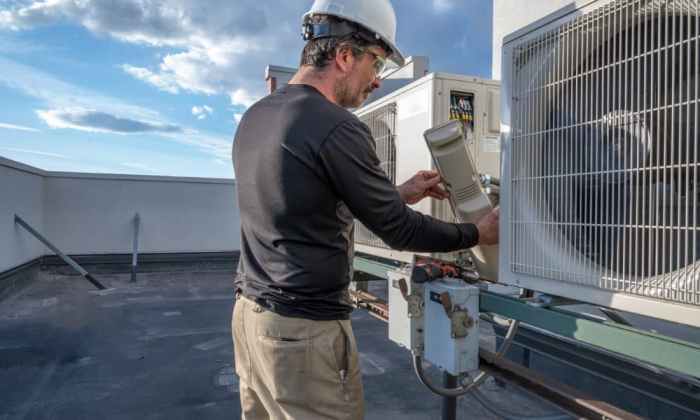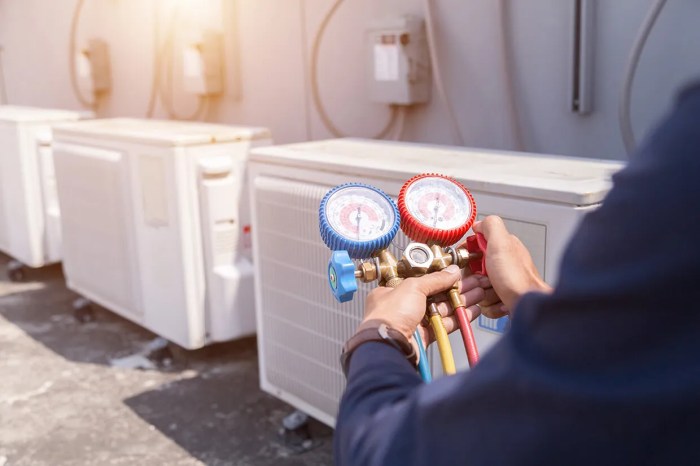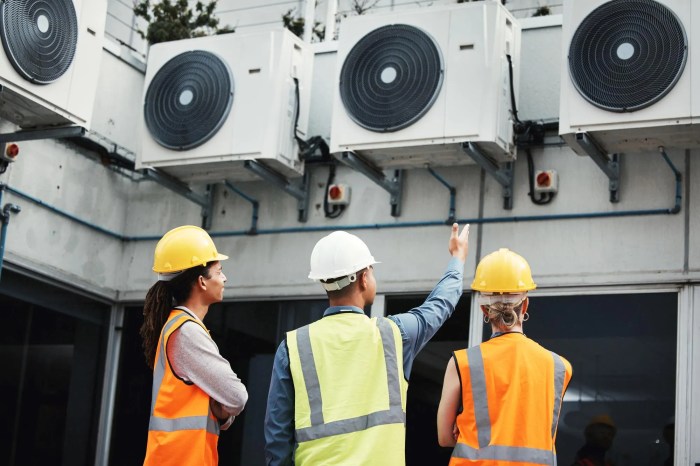Enhancing Efficiency: The Key to Successful Commercial HVAC Maintenance
Embark on a journey through the world of commercial HVAC maintenance, where the importance of regular upkeep goes beyond just functionality. Dive into the realm of indoor air quality, system efficiency, and occupant comfort as we uncover the vital role maintenance plays in a commercial setting.
Explore the components of a comprehensive maintenance plan, the benefits of outsourcing maintenance, common challenges faced, and the latest technologies shaping the future of HVAC maintenance.
Importance of Commercial HVAC Maintenance
Regular maintenance of commercial HVAC systems is crucial for ensuring optimal performance and longevity. Neglecting maintenance can lead to a range of issues that affect system efficiency and lifespan, ultimately resulting in higher energy costs and frequent breakdowns. Proper maintenance not only helps prevent costly repairs but also improves indoor air quality and enhances comfort for building occupants.
Impact of Neglected Maintenance
Neglecting maintenance tasks such as filter replacements, coil cleaning, and system inspections can result in reduced airflow, increased energy consumption, and premature wear and tear on components. This can lead to system malfunctions, decreased cooling or heating capacity, and ultimately, system failure.
Regular maintenance helps identify and address potential issues before they escalate, ensuring optimal performance and extending the lifespan of the HVAC system.
Improving Indoor Air Quality
Proper maintenance of HVAC systems involves cleaning and disinfecting components, removing built-up debris, and ensuring adequate ventilation. This not only helps prevent the spread of airborne contaminants but also improves indoor air quality by reducing allergens, pollutants, and humidity levels.
By maintaining clean and efficient HVAC systems, building occupants can enjoy a healthier and more comfortable indoor environment.
Components of a Commercial HVAC Maintenance Plan

Regular maintenance is essential to ensure optimal performance and longevity of your commercial HVAC system. A comprehensive maintenance plan should include the following key components:
1. Filter Replacement
Regular filter replacement is crucial to maintain indoor air quality and prevent strain on the HVAC system. Filters should be checked monthly and replaced as needed, typically every 1-3 months depending on the type of filter and level of usage.
2. Coil Cleaning
Coils in the HVAC system can accumulate dirt and debris over time, reducing efficiency and airflow. Professional coil cleaning should be performed at least once a year to improve system performance and prevent breakdowns.
3. System Inspections
Regular system inspections by HVAC professionals are vital to identify any potential issues early on and prevent costly repairs. These inspections should be scheduled at least twice a year, ideally in the spring and fall, to ensure the system is ready for the upcoming seasons.
4. Preventive Maintenance Visits
Scheduling regular preventive maintenance visits with HVAC professionals is key to keeping your commercial HVAC system running smoothly. These visits allow professionals to detect any issues, make necessary adjustments, and ensure the system is operating at peak efficiency.
Benefits of Outsourcing HVAC Maintenance

Outsourcing HVAC maintenance can offer numerous benefits for businesses looking to maintain their heating, ventilation, and air conditioning systems in top condition. By comparing the advantages of outsourcing HVAC maintenance versus having an in-house maintenance team, businesses can make informed decisions to improve efficiency and reduce costs.
Cost Savings and Efficiency Improvements
Outsourcing HVAC maintenance can lead to significant cost savings for businesses. By partnering with a specialized HVAC maintenance provider, companies can benefit from the expertise and resources of a dedicated team without the need to hire and train in-house staff.
This can result in reduced labor costs, as well as improved efficiency in maintenance tasks, ultimately leading to lower operational expenses.
Compliance with Industry Regulations and Standards
Outsourcing HVAC maintenance can also ensure that businesses remain compliant with industry regulations and standards. HVAC systems are subject to various regulations to ensure safety, efficiency, and environmental sustainability. By outsourcing maintenance to a qualified provider, businesses can rely on experts who are well-versed in these regulations and can ensure that the systems are maintained in accordance with the necessary standards.
This can help avoid costly fines or penalties for non-compliance.
Common HVAC Maintenance Challenges
Maintaining commercial HVAC systems comes with its own set of challenges that can impact the efficiency and longevity of the equipment. It is essential to address these challenges effectively to ensure optimal performance and prevent costly breakdowns.
1. Lack of Regular Maintenance
One common challenge faced in HVAC maintenance is the lack of regular servicing and inspections. Without consistent maintenance, issues can go undetected and lead to major breakdowns.
2. Dirty or Clogged Filters
Dirty or clogged filters can restrict airflow and cause the HVAC system to work harder, leading to increased energy consumption and potential damage to the equipment.
3. Refrigerant Leaks
Refrigerant leaks are another common issue that can impact the performance of the HVAC system. These leaks not only affect cooling capacity but also contribute to environmental harm.
4. Wear and Tear on Components
Over time, components of the HVAC system can experience wear and tear, affecting their efficiency and performance. Regular maintenance is essential to address these issues before they escalate.
5. Inadequate System Calibration
If the HVAC system is not properly calibrated, it can lead to uneven temperatures, poor air quality, and increased energy consumption. Proper calibration is crucial for optimal performance.
Technologies and Trends in Commercial HVAC Maintenance
Commercial HVAC maintenance is constantly evolving with the integration of new technologies and trends that aim to enhance efficiency, reduce costs, and improve overall system performance. Let’s explore some of the emerging technologies and trends shaping the landscape of commercial HVAC maintenance.
Smart Sensors for Real-Time Monitoring
Smart sensors are revolutionizing the way HVAC systems are maintained by providing real-time data on system performance, energy consumption, and potential issues. These sensors can detect anomalies and notify maintenance teams before a major breakdown occurs, allowing for proactive maintenance rather than reactive repairs.
Predictive Maintenance with Data Analytics
Predictive maintenance uses advanced data analytics to predict when components are likely to fail, allowing for timely replacements and repairs. By analyzing historical data and performance trends, maintenance schedules can be optimized, reducing downtime and extending the lifespan of HVAC equipment.
Remote Monitoring and Control Systems
Remote monitoring and control systems enable maintenance teams to monitor and adjust HVAC systems from anywhere, providing greater flexibility and efficiency. Through cloud-based platforms, technicians can access system data, troubleshoot issues, and make adjustments remotely, saving time and resources.
Energy-Efficient HVAC Technologies
Energy-efficient HVAC technologies, such as variable refrigerant flow (VRF) systems and high-efficiency HVAC units, are becoming increasingly popular in commercial buildings. These technologies not only reduce energy consumption and operating costs but also require less maintenance compared to traditional systems, leading to long-term savings.
Integration of Artificial Intelligence (AI)
Artificial intelligence is being integrated into HVAC maintenance processes to analyze vast amounts of data and optimize system performance. AI algorithms can identify patterns, predict potential failures, and recommend solutions, streamlining maintenance operations and maximizing system efficiency.
Enhanced Communication and Collaboration Tools
Communication and collaboration tools, such as mobile apps and cloud-based platforms, are improving the coordination of maintenance teams and streamlining work order management. These tools enable real-time communication, task assignment, and documentation, ensuring efficient and transparent maintenance processes.
Wrap-Up

As we conclude our exploration of commercial HVAC maintenance, it becomes evident that proactive upkeep is not just a necessity but a strategic advantage. By staying ahead of maintenance challenges and embracing technological advancements, businesses can ensure optimal performance and longevity of their HVAC systems.
Questions Often Asked
What are the consequences of neglecting commercial HVAC maintenance?
Neglecting maintenance can lead to decreased system efficiency, higher energy costs, poor indoor air quality, and shortened lifespan of HVAC equipment.
How often should filter replacement and coil cleaning be done in a commercial HVAC system?
Filters should typically be replaced every 1-3 months, while coil cleaning should be done annually to maintain optimal system performance.
What are some strategies for overcoming common HVAC maintenance challenges?
Regular preventive maintenance, training staff on basic maintenance tasks, and partnering with reliable HVAC service providers can help overcome common challenges effectively.
How do emerging technologies like smart sensors impact commercial HVAC maintenance?
Smart sensors can enable predictive maintenance, allowing for early detection of issues and proactive maintenance scheduling to prevent system failures and optimize performance.




